★★★★
“Is for girls with guns, what Night of the Living Dead is for zombies.”

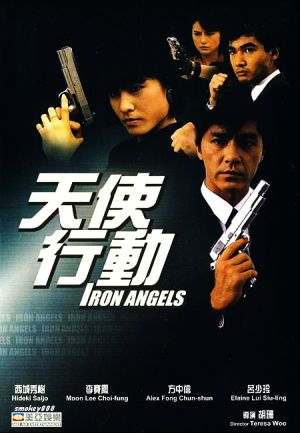 This and Yes, Madam were basically the Genesis and Exodus of the genre as we know it. Sure, there had been action heroines before, but never with quite the heft of their male counterparts. Madam showed they could kick ass with the best of them; Angel took this, and added about a billion bullets to the mix. Sure, it’s rough around the edges, with scenes that appear randomly inserted and characters so shallow they resemble a puddle. But its influence was massive, and if you can watch the final battle without wincing, as Lee and Oshima kick the utter crap out of each other, you’re made of tougher stuff than I [It’s the December 2011 video of the month].
This and Yes, Madam were basically the Genesis and Exodus of the genre as we know it. Sure, there had been action heroines before, but never with quite the heft of their male counterparts. Madam showed they could kick ass with the best of them; Angel took this, and added about a billion bullets to the mix. Sure, it’s rough around the edges, with scenes that appear randomly inserted and characters so shallow they resemble a puddle. But its influence was massive, and if you can watch the final battle without wincing, as Lee and Oshima kick the utter crap out of each other, you’re made of tougher stuff than I [It’s the December 2011 video of the month].
The plot sees the ‘Angels’ – a mercenary, extra-governmental group – called in to take on a drug-smuggling cartel which is killing off cops following success against their heroin operation. It’s led by the amazingly evil Madame Yeoung (Oshima, turned up to 11), who is planning something to recoup the lost income; what that is, is up to the Angels to find out. Of particular interest, the Angels include Moon and Elaine (Lee and Lui), the former sober, the latter flighty and apparently incompetent; they and their much less-interesting male counterparts have to uncover Yeoung’s plan, rescue captured colleagues from her HQ, in a blaze of gunfire, and then go to the factory that’s at the heart of the villainess’s operations, for the final battle.
Like Living Dead, it’s certainly something which has been done a good deal better since, with the non-action elements clunky to the point of occasionally cringe-inducing, especially during a first half that does take some time to get going – though spontaneously combusts whenever Oshima is on-screen. However, once it does, this is packed with meaty goodness, and a take no prisoners approach from both sides that makes for an all-out war. There’s some confusion over the directors: the DVD box gives it as Teresa Woo, the IMDB lists Woo and Leung, but I’ve gone with the names listed on the actual movie credits. Whoever it was, certainly had a great handle on the action, and time has not dulled that aspect of the film whatsoever.
Dir: Raymond Leung, Leung Siu Hung, Ivan Lai
Star: Moon Lee, Hideki Saijo, Elaine Lui, Yukari Oshima
a.k.a. Iron Angels





 A loosely-related sequel to Oshii’s last live-action film, Avalon, this is similarly set in a VR world, and muses on the relationship between real life and game life. This one is a lot less populated; there are only four people in it, roaming a desert landscape, with the targets being giant sandworms (think Dune) and the “boss” Madara, the mother of all sandworms, whom the game helpfully informs contestants, cannot be killed single-handed. The four get together to launch an attack on it, having agreed to split the game reward equally. Is that quite how things are going to turn out?
A loosely-related sequel to Oshii’s last live-action film, Avalon, this is similarly set in a VR world, and muses on the relationship between real life and game life. This one is a lot less populated; there are only four people in it, roaming a desert landscape, with the targets being giant sandworms (think Dune) and the “boss” Madara, the mother of all sandworms, whom the game helpfully informs contestants, cannot be killed single-handed. The four get together to launch an attack on it, having agreed to split the game reward equally. Is that quite how things are going to turn out?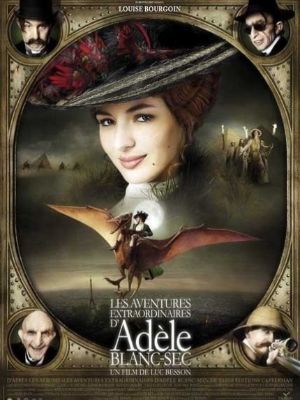 Good to see Besson back in the director’s chair. Outside of the kids’ Arthur series, the only movie he personally helmed in the 2000’s was Angel-A, but Besson has been delivering action heroines for 20 years. Most obviously with the hugely-influential Nikita, but also in The Messenger and, to some extent The Fifth Element and Leon. Here, he goes back to just before the first World War, where journalist Adèle Blanc-Sec (Bourgoin) is kinda like a proto-Lara, whizzing around the globe in search of adventure. She heads to Egypt to grab the mummy belonging to Ramses’s physician: she’s been working with Prof. Ménard (Nahon), who has discovered how to bring the dead back to life, and wants to use the arcane knowledge the mummy possesses to help her sister, who has been in a coma for five years. But Ménard, unwilling to wait, tests his powers on a prehistoric egg: the resulting pterodactyl escapes from the museum where it is housed, and terrorizes Paris. Detective Caponi (Lellouche) is on that case…
Good to see Besson back in the director’s chair. Outside of the kids’ Arthur series, the only movie he personally helmed in the 2000’s was Angel-A, but Besson has been delivering action heroines for 20 years. Most obviously with the hugely-influential Nikita, but also in The Messenger and, to some extent The Fifth Element and Leon. Here, he goes back to just before the first World War, where journalist Adèle Blanc-Sec (Bourgoin) is kinda like a proto-Lara, whizzing around the globe in search of adventure. She heads to Egypt to grab the mummy belonging to Ramses’s physician: she’s been working with Prof. Ménard (Nahon), who has discovered how to bring the dead back to life, and wants to use the arcane knowledge the mummy possesses to help her sister, who has been in a coma for five years. But Ménard, unwilling to wait, tests his powers on a prehistoric egg: the resulting pterodactyl escapes from the museum where it is housed, and terrorizes Paris. Detective Caponi (Lellouche) is on that case… About ten minutes into this, as another large explosion filled the screen, Chris turned to me and said, “Is this a Michael Bay movie?” While it isn’t, confusion is understandable: this is just the kind of dumb action film for which he is renowned, featuring basic plotting and large-scale mayhem. Terrorist Jaffad is just about to sell four nuclear warheads he has hidden in major cities worldwide back to the Americans, when his entire compound is taken out, at the command of a mysterious figure known as “The Butcher.” FSB Agent Marie (Zavorotnyuk), who had previously been working undercover to get to Jaffad, just manages to escape the slaughter, and is now assigned to track down the Butcher, by getting close to his financial advisor, Louis (Perez). Jaffad gave parts of the eleven-digit code that can be used to detonate the devices, to trusted colleagues in Italy, Norway and Malaysia, and Marie needs to find the code before the Butcher.
About ten minutes into this, as another large explosion filled the screen, Chris turned to me and said, “Is this a Michael Bay movie?” While it isn’t, confusion is understandable: this is just the kind of dumb action film for which he is renowned, featuring basic plotting and large-scale mayhem. Terrorist Jaffad is just about to sell four nuclear warheads he has hidden in major cities worldwide back to the Americans, when his entire compound is taken out, at the command of a mysterious figure known as “The Butcher.” FSB Agent Marie (Zavorotnyuk), who had previously been working undercover to get to Jaffad, just manages to escape the slaughter, and is now assigned to track down the Butcher, by getting close to his financial advisor, Louis (Perez). Jaffad gave parts of the eleven-digit code that can be used to detonate the devices, to trusted colleagues in Italy, Norway and Malaysia, and Marie needs to find the code before the Butcher.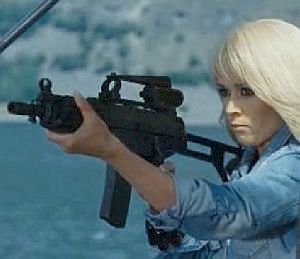 However, the plot is not novel at all, the efforts to give Marie backstory are near-laughable, and once the novelty of the Russian heroes wears off, the script has little to offer: significant fragments don’t make much sense, and other scenes seem to be there, just to prove the makers actually went to the locations. Action-wise, it’s somewhat of a mixed bag; it seems pretty clear the lead actress isn’t doing much of the action herself, but there’s a nice fight at the end between Marie and the villain, in front of the console which can be used to detonate the bombs, as a self-destruct timer counts down. You can also enjoy a gun-battle on a boat, and Marie stocking the corridors of a hotel [you’ll understand why I spelled it like that, hohoho].
However, the plot is not novel at all, the efforts to give Marie backstory are near-laughable, and once the novelty of the Russian heroes wears off, the script has little to offer: significant fragments don’t make much sense, and other scenes seem to be there, just to prove the makers actually went to the locations. Action-wise, it’s somewhat of a mixed bag; it seems pretty clear the lead actress isn’t doing much of the action herself, but there’s a nice fight at the end between Marie and the villain, in front of the console which can be used to detonate the bombs, as a self-destruct timer counts down. You can also enjoy a gun-battle on a boat, and Marie stocking the corridors of a hotel [you’ll understand why I spelled it like that, hohoho].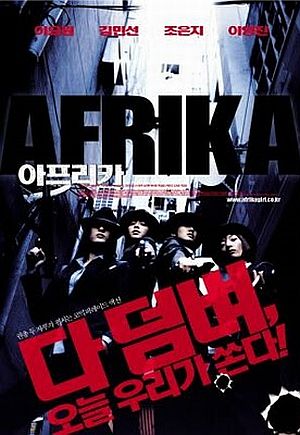 Ji-Won (Lee Yo-Won) and her friend So-Hyun (Kim) make a trip to the seaside, borrowing a car from a friend. However, the auto turns out to have a couple of guns in it, lost by a gangster and cop in a poker game. The weapons come in handy when the girls need to escape from some assailants, but when they are joined by a manic waitress with no sense of gun-control, the now-trio find themselves on the run from police. A clothing-store owner with a grudge, completes the quartet, as they try to make their way back to Seoul – and they are pursued not only by the cops, also by the previous owners of the guns, who need to get them back to prevent issues of their own. Conversely, their exploits and subsequent media attention are getting them fans of their own, with the titular website (it stands for Adoring Four Revolutionary Idols Korea Association) extolling their virtues and provoking copycat crimes.
Ji-Won (Lee Yo-Won) and her friend So-Hyun (Kim) make a trip to the seaside, borrowing a car from a friend. However, the auto turns out to have a couple of guns in it, lost by a gangster and cop in a poker game. The weapons come in handy when the girls need to escape from some assailants, but when they are joined by a manic waitress with no sense of gun-control, the now-trio find themselves on the run from police. A clothing-store owner with a grudge, completes the quartet, as they try to make their way back to Seoul – and they are pursued not only by the cops, also by the previous owners of the guns, who need to get them back to prevent issues of their own. Conversely, their exploits and subsequent media attention are getting them fans of their own, with the titular website (it stands for Adoring Four Revolutionary Idols Korea Association) extolling their virtues and provoking copycat crimes. Ok, that brief is a little harsh, but it is true to say by the end, I had opted to double-task, and was watching this while I stood over the sink in the kitchen. It wasn’t as good as I expected: I was hoping for something along the lines of Faster, Pussycat, and instead got a turgid, over-extended crime drama. While it has all the right aspirations, the yawning chasm between that and its execution would require several days’ trip by mule to cross. Alice Wynn (Sondrup) is part of an armored-truck robbery, only to find herself double-crossed and left for dead by corrupt cop Jill Robbe (Beisner). Alice vows to recover the loot and take revenge on Robbe, and won’t let anyone – examples include her late mother’s boyfriend, psychotic pimp Ramrod or his Swedish assassin – stand in her way.
Ok, that brief is a little harsh, but it is true to say by the end, I had opted to double-task, and was watching this while I stood over the sink in the kitchen. It wasn’t as good as I expected: I was hoping for something along the lines of Faster, Pussycat, and instead got a turgid, over-extended crime drama. While it has all the right aspirations, the yawning chasm between that and its execution would require several days’ trip by mule to cross. Alice Wynn (Sondrup) is part of an armored-truck robbery, only to find herself double-crossed and left for dead by corrupt cop Jill Robbe (Beisner). Alice vows to recover the loot and take revenge on Robbe, and won’t let anyone – examples include her late mother’s boyfriend, psychotic pimp Ramrod or his Swedish assassin – stand in her way.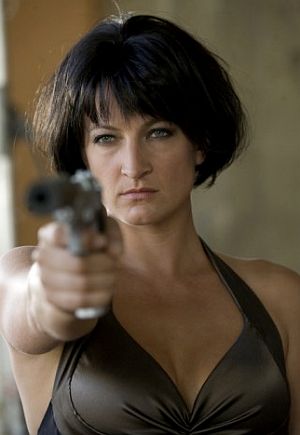 After making an undeniable impact strapped to a car bonnet in the second-half of Grindhouse, Zo…Hang on, let me find the right key on the keyboard… Ah, there we are… Zoë gets to do some actual ‘acting’, rather than playing a stuntwoman called Zoë Bell [Way to go, Tarantino!] Thios started as a web-based series of ten episodes, but is now available on DVD, which is how we watched it. Bell plays Eve, an assassin whose personality radically changes after she is stabbed in the head. She starts to see one of her victims – a young girl – and as a result, decides to go after those who ordered the death. Needless to say, her manager and handler Graham (Poth) is not impressed by this sudden burst of morality, and neither are those who have now become her target, including up-and-coming gangster boss Jake Abel, who sends his minions out to take care of her before she takes care of him.
After making an undeniable impact strapped to a car bonnet in the second-half of Grindhouse, Zo…Hang on, let me find the right key on the keyboard… Ah, there we are… Zoë gets to do some actual ‘acting’, rather than playing a stuntwoman called Zoë Bell [Way to go, Tarantino!] Thios started as a web-based series of ten episodes, but is now available on DVD, which is how we watched it. Bell plays Eve, an assassin whose personality radically changes after she is stabbed in the head. She starts to see one of her victims – a young girl – and as a result, decides to go after those who ordered the death. Needless to say, her manager and handler Graham (Poth) is not impressed by this sudden burst of morality, and neither are those who have now become her target, including up-and-coming gangster boss Jake Abel, who sends his minions out to take care of her before she takes care of him. Film-makers really need to let the sixties go, especially when it comes to mining TV schedules and turning them into movies. The Mod Squad, Thunderbirds, Wild Wild West: the remainder bins in Walmart are littered with the DVD corpses of failed attempts. While it’d be a massive stretch to call this incoherent mess anything like a success, it does have some merits, not least in the casting of Fiennes and Thurman as John Steed and Emma Peel. If undeniably different to Patrick McNee and , it still works, despite the unfortunate efforts to shoehorn in a romantic relationship between the pair; one of the things that made the original series work was the
Film-makers really need to let the sixties go, especially when it comes to mining TV schedules and turning them into movies. The Mod Squad, Thunderbirds, Wild Wild West: the remainder bins in Walmart are littered with the DVD corpses of failed attempts. While it’d be a massive stretch to call this incoherent mess anything like a success, it does have some merits, not least in the casting of Fiennes and Thurman as John Steed and Emma Peel. If undeniably different to Patrick McNee and , it still works, despite the unfortunate efforts to shoehorn in a romantic relationship between the pair; one of the things that made the original series work was the 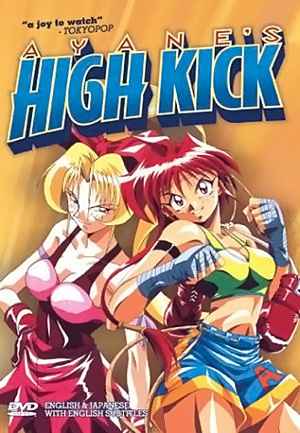 Ayane tries out for the All-Japan Women’s pro-wrestling federation, but is rejected. However, on the way home, she meets a mysterious trainer, who recruits her for his indie group, promising that if she does well, AJW will likely pick her up. What Ayane doesn’t know, is that her trainer has no interest in pro-wrestling, but wants to use our heroine’s lethal leg skills to make her a kick-boxing champion. Ayane eventually discovers the truth, literally in the ring at her first bout; after the inevitable struggles, she wins, in spectacular style, but vows to quit the sport. However, her victory grabbing the headlines infuriates a rival, who turns up at Ayane’s school to issue a challenge. Which is not good, since the vice-principal is just looking for an excuse to expel her.
Ayane tries out for the All-Japan Women’s pro-wrestling federation, but is rejected. However, on the way home, she meets a mysterious trainer, who recruits her for his indie group, promising that if she does well, AJW will likely pick her up. What Ayane doesn’t know, is that her trainer has no interest in pro-wrestling, but wants to use our heroine’s lethal leg skills to make her a kick-boxing champion. Ayane eventually discovers the truth, literally in the ring at her first bout; after the inevitable struggles, she wins, in spectacular style, but vows to quit the sport. However, her victory grabbing the headlines infuriates a rival, who turns up at Ayane’s school to issue a challenge. Which is not good, since the vice-principal is just looking for an excuse to expel her.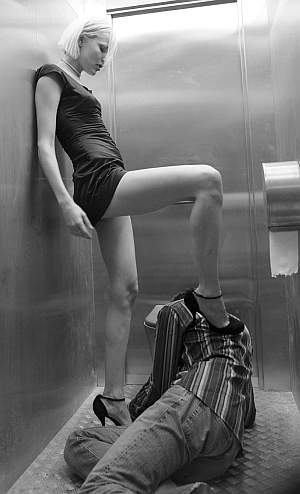 Andre (Debbouse) is at the end of his tether, owing large amounts of money to at least three separate gangs. He decides to end it all by leaping off a Parisian bridge into the Seine below, but is beaten to it by the tall, leggy blonde, Angela (Rasmussen, who you may remember in a bathroom stall with Rebecca Romijn-Stamos in the opening of Femme Fatale). His suicide forgotten, he jumps in to save her, and as they sit, dripping on the river-bank she vows that she will repay his selfless act by taking care of him. This may not be quite the way he expects; for example, she hijacks a negotiation with one of the mobsters to whom Andre owes money, marches upstairs and emerges not long afterwards, the debt apparently forgiven and with tens of thousands in bonus cash. Just as important as resolving his pecuniary problems are the emotional ones which plague Andre, and Angela is perhaps even more adept at addressing those: his lack of self-confidence, trust issues, an inability to give or receive love and so on. She sees the good person who is buried
Andre (Debbouse) is at the end of his tether, owing large amounts of money to at least three separate gangs. He decides to end it all by leaping off a Parisian bridge into the Seine below, but is beaten to it by the tall, leggy blonde, Angela (Rasmussen, who you may remember in a bathroom stall with Rebecca Romijn-Stamos in the opening of Femme Fatale). His suicide forgotten, he jumps in to save her, and as they sit, dripping on the river-bank she vows that she will repay his selfless act by taking care of him. This may not be quite the way he expects; for example, she hijacks a negotiation with one of the mobsters to whom Andre owes money, marches upstairs and emerges not long afterwards, the debt apparently forgiven and with tens of thousands in bonus cash. Just as important as resolving his pecuniary problems are the emotional ones which plague Andre, and Angela is perhaps even more adept at addressing those: his lack of self-confidence, trust issues, an inability to give or receive love and so on. She sees the good person who is buried